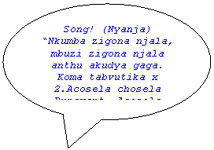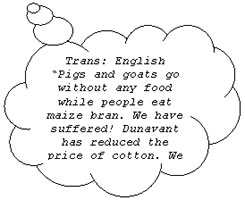
|
|
|
The realities of unfair trade - The case of small scale cotton farmers in Zambia
|
|
James Mbewe another farmer of Chipata speaks of the disparity between the employees of the multi national companies and the cotton farmers.
He said the workers of the Multi National Companies are earning in excess of ZMK 5 000 000 every year while cotton farmers do not even reach the ZMK 2 000 000 mark over the same period, when they are the ones who grow the cotton.
"Their workers are earning more than ZMK 5 000 000 every year while I as a farmer is not even earning close to ZMK 2 000 000 in a year. Is it worth continuing when I the producer is not gaining anything?" he wondered.
James in signing to the 'Big Noise" Campaign says the Zambian government should represent farmers for world leaders to act on improving the prices of cotton hence improving the living standards of farmers.
He proposed a buying price of ZMK 5 000 per kilogram.
[Interview by Mutuna Chanda - Reporter, QFM Radio]
Aaron NKhoma of Chipata said because of the low returns from cotton farming, farmers have no way out.
He said they keep going back to the same multi national companies under the same conditions of trade without graduating to a level where they would not get the seeds and fertlizer on loan.
And according to him, " The Multi Ntaional Companies are exploiting us. This is another form of slavery".
For Aaron, petitioning world leaders through the Oxfam led "Big Noise" Campaign is a way of ending the new form of slavery which would lead to farmers' independence.
Also expressing similar sentiments was Petauke cotton farmer Alick Phiri who said, "To me it's just as though we are working for the Multi National Companies. The money I get from cotton farming does not even last my family and I three months".

|
We work day in day out, hoping to lift ourselves out of poverty and hunger but at the end of it all we get literally nothing because of poor prices of cotton offered to us by multinational companies. We work like slaves or prisoner of the companies who are getting richer everyday. We are just being used as cheap labour!!!
(Picture from BBC Website)
|
Verinas Mwanza a thirty four year old female farmer of Chipata also has a similar position.
She said, "What I owed the Multi National Company last farming season exceeded what I earned after selling my produce owing to the low prices that they were offering".
"I was owing them ZMK 180 000 and I was only able to pay back ZMK 130 000. I still owe the company ZMK 50 000".
She proposed a buying price of ZMK 5 000 as opposed to the ZMK 1 200 at the most that the Multi National Companies were offering.
Emerging from Eastern province tour together with the leading Zambian institution, Organisation Development and Community Management Trust (ODCMT), advancing the cause of better prices for cotton farmers was Singer James 'Chamanyazi' who in his reflection of what he saw and heard said, " I'm encouraged to champion the causes of farmers even more because they have told me their stories".
"I'm a bit hopeful and hopeless. I saw very sad sights and heard sad stories from people who have been spending a lot of time to produce cotton. But I hope that with the voice that the cotton farmers have raised through signatures, change will come".
The "Big Noise" Campaign being executed by ODCMT in Zambia to me appears the cotton farmers' lifeline.
Small-scale cotton farmers feel abandoned as there is no formal dialogue between them and the Multi National companies or the government and it is the "Big Noise" that only seems to create a way of airing their grievances.
However as a reporter, living to see and hear the experiences of the small-scale farmers what struck me the most was the moving spirit of resilience, hope and courage.
Seeing people not giving up despite the toughest of conditions told me that to them letting go on cotton farming was letting go on life. But life must be worth living and for that to happen for cotton farmers in Zambia a lot needs to change for the better and the World Trade Organisation (WTO) must not only hear their cries but act to improve things for them.

|
|
Mutuna Chanda-Reporter QFM Radio, Zambia
|
Mr. Zulu - Caretaker at Tikondane Community Centre. (No picture)
Qst: What do you know about cotton trade?
Answer: "I am not a cotton farmer but my children are. However, I know that they get seed, chemicals and fertilizer from companies like Dunavant and Clark on loan.
They have always said that there is a lot of exploitation in the business. My children have always complained about the low prices. The other problems they can say for themselves.
That's all I know. Sometimes I ask my children why they continued to be in the business".
Qst: But why are you signing the petition?

|
|
Cotton farmer signing the petition.
|
Answer: "I am signing because it involves my children and I know how much they suffer. Sometimes I have to feed their children. That is a great concern for me".
Ester Zulu Katete
"I am very disappointed with the way the cotton business is being conducted in Zambia. My father is a cotton farmer and has been for more than 10 years but it is shocking to see how he looks. I have advised him to stop growing cotton but he seems too stubborn and says that at least there is ready market for the commodity despite the low prices and many other problems. Asked if she could state some of the problems that her father was referring to. Ester said she could not do that but she new about the price and grading of cotton".
Mrs. Tembo - Chairlady for women cotton growers
She says that she is aware of the price problems in the cotton business. "I grow cotton but what really shocks me is that prices of many other things like fertilizers, chemicals and other inputs have increased but the cotton prices have always moved in the opposite direction- they are always going down. The other problem I see is the issue of grading and weighing of cotton. I personally do not trust the scales that these people use. I suspect that the scales are fine-tuned. I have no evidence but I am sure about what I am saying. Someone should investigate this. I don't know, maybe it's because of the agents who buy cotton on behalf of the companies. Anyway, the problems are many and they need the intervention of government"
Mrs. Tembo added to say that she was tired of seeing people who come and say they would help but go forever. "They are just making money on all the interviews. I am currently concentrating on the hunger situation but I am able to talk to you because of the respect I have for people and because I am a cotton grower. This hunger is here for a short period but the issue of cotton will continue to exist for as long as I grow my cotton.
I have to also fight for a better share in the business". "I hope your organisation will do more than this interview".
"I have noticed that the situation is this way because there has been only one company dominating the industry. We need to see more companies coming up to the cotton business, otherwise we shall always cry foul. Farmers also are not organized. We have had situations where we agree not to sell the cotton to the company but you find that some of our friends would go ahead and sell the commodity at the same low price. This makes it difficult for us as farmers to have one voice. We need to one day see a situation where small-scale farmers get together and fight for what belongs to them on their own. Probably your organisation can help us come up with the grouping".
"Because of these problems, I am signing this petition - I hope they will listen this time"!
Kagoro area villagers
Its paining us, especially that we are now hungry. If we had made enough money, maybe we could have bought food for ourselves. So let us find the solution now!! Why are the prices getting lower and lower every year? This campaign is good because it gives us chance to get involved. We have to get involved because if we do not, then we shall continue to face the hunger, which we are facing now. Lets not sit back because if we do which means we are killing ourselves.
It pains to grow cotton. The sprayers are very heavy and if you had to look at the backs of the people who lift these sprayers, then you will know what we mean. Look at our hands; we look like monkeys because of hard work - not only because of cotton but farming in general. Our message to the WTO is that please, here in Zambia, Africa, Asia and many other places around the globe, it is hurting us. We are waiting for your meeting and even if we are not going to follow up the talks but our ministers are representing us. These petitions are our voices and if you have ears then you must listen this time around. Americans and Europeans are not different from us all. Why should you always favour them? God will punish you for this!
And for you ODCMT and Oxfam, how shall you ensure that the outcomes of this petition are known here? We hope you are not just like many others who have come and gone. You should show some action towards these issues.

|

|
"Our cotton is pure and clean because we harvest it using our hands, but we get very little from its sales"!
(This is a cry of a small-scale farmer in Zambia and many other developing states)(Picture by ODCMT)
|
Harvesting cotton in the developed world is so easy because farmers are heavily subsidized! They can afford to buy or hire expensive equipment. (Picture from BBC website)
|

|
|
MASULANI SAKALA
|

|
Masulani says:
"I am hurt and that's why I am singing this way".
"I am hurt because last year I failed to pay back my loan in full and these guys ruthlessly came and got my blankets and goat. The blankets even smelled urine as kids were using them. They are really shameless!"
Mr. Sakala challenged the audience with the following questions:
"Do you have food in your Bans?"………....No!!!!!
"Do you have money in your homes?" ……. No!!!!!
"I am hurt and it should also hurt you. Lets speak out now. Don't keep quiet!"
|
|






